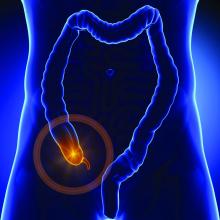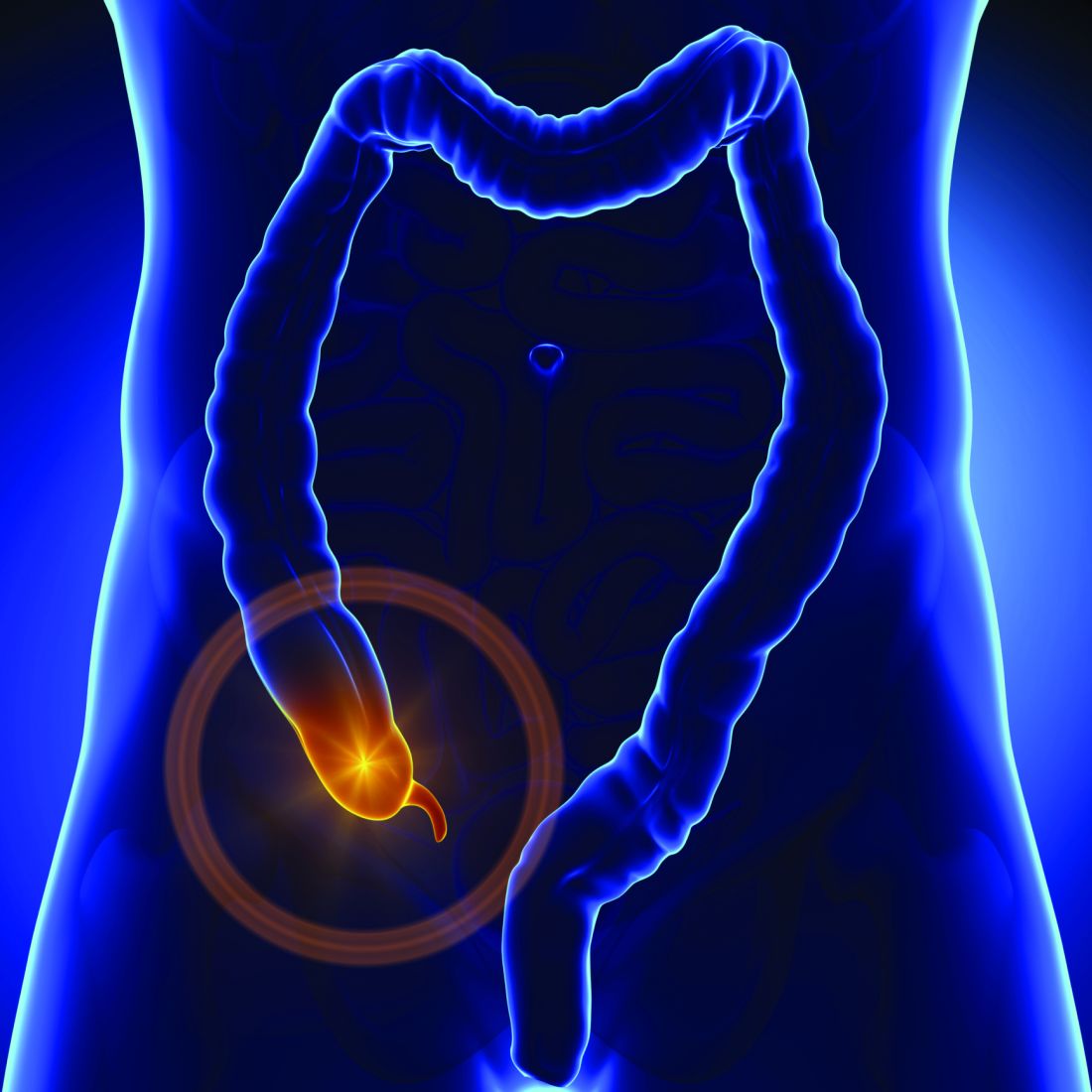User login
LAS VEGAS – Contrary to what some recent studies suggest, patients with complicated appendicitis may benefit from immediate surgery, with shorter hospital stays and fewer postoperative complications.
According to findings from a large database review, delaying the surgery for a complicated case is likely to result in worse patient outcomes, Matthew Symer, MD, said at the Association for Academic Surgery/Society of University Surgeons Academic Surgical Congress.
There are no firm guidelines about the timing of surgery for complicated appendicitis, he said. “There is in fact some controversy about the timing of surgery,” with studies coming to conflicting conclusions about the benefits and risks of both immediate and delayed treatment. “We theorized that the potential morbidity of operating at the height of the inflammatory process would be less than the risk of complications associated with delay,” he said.
To investigate the question, Dr. Symer and his colleagues queried the New York Statewide Planning and Research Cooperative Database, which contains information on all hospital admissions with an ICD-9 code on any patient covered by any payer in the state. Each patient has a unique identifier that allows tracking over time and across facilities.
From 2000 to 2013, the investigators identified 38,840 patients who presented with complicated appendicitis, defined as a perforation. Of these, 31,167 had an appendectomy within 1 year of the index admission. These patients were separated into two groups: those who had surgery within 48 hours of the index admission (28,015) and those who had later surgery (3,152).
The delayed surgery group was further parsed into three: those who had surgery during the index admission, but at least 48 hours after admission (51%); those who had an appendectomy at a subsequent urgent admission (23%); and those who had an elective interval appendectomy sometime within that year (26%).
In comparing the early vs. late surgery groups overall, Dr. Symer noticed some significant initial differences. Patients in the early surgery group were significantly younger (48 vs. 53 years), more likely to be male (55% vs. 47%), white (70% vs. 64%), and to have private insurance (53% vs. 45%).
Comorbidities were more common among the delayed surgery group. These included chronic obstructive pulmonary disease, renal failure, coronary artery disease, hypertension, diabetes, and congestive heart failure. Delayed-surgery patients were more likely to be treated at high-volume hospitals (45% vs. 34%).
Abscess was more common among the delayed surgery group (72% vs. 51%). Their median length of stay was significantly longer (9 vs. 5 days).
Delayed-surgery patients experienced significantly more iatrogenic complications (4% vs. 2%), and more urinary and wound complications. Overall, two or more complications occurred in 23% of the delayed surgery group and 14% of the early surgery group. The readmission rate was higher (28% vs. 18%). Significantly more in the delayed group reached the 75th percentile in hospital charges (62% vs. 26%).
In a multivariate regression analysis, patients with delayed surgery were more likely to experience a prolonged length of stay (odds ratio, 6); high hospital charges (OR, 4.8), iatrogenic complications (OR, 1.9), any complications (OR, 1.5) and readmission (OR, 1.5).
These findings were largely recapitulated when Dr. Symer broke the delayed group down into the three subgroups: patients who had surgery late in the index admission, patients who had an urgent later appendectomy, and patients who had a later elective procedure.
“All of these relationships held up, with patients who delayed surgery having worse overall complications, whether iatrogenic or any complications, more readmissions, and a longer stay in the hospital,” Dr. Symer said.
He had no financial disclosures.
[email protected]
On Twitter @Alz_Gal
LAS VEGAS – Contrary to what some recent studies suggest, patients with complicated appendicitis may benefit from immediate surgery, with shorter hospital stays and fewer postoperative complications.
According to findings from a large database review, delaying the surgery for a complicated case is likely to result in worse patient outcomes, Matthew Symer, MD, said at the Association for Academic Surgery/Society of University Surgeons Academic Surgical Congress.
There are no firm guidelines about the timing of surgery for complicated appendicitis, he said. “There is in fact some controversy about the timing of surgery,” with studies coming to conflicting conclusions about the benefits and risks of both immediate and delayed treatment. “We theorized that the potential morbidity of operating at the height of the inflammatory process would be less than the risk of complications associated with delay,” he said.
To investigate the question, Dr. Symer and his colleagues queried the New York Statewide Planning and Research Cooperative Database, which contains information on all hospital admissions with an ICD-9 code on any patient covered by any payer in the state. Each patient has a unique identifier that allows tracking over time and across facilities.
From 2000 to 2013, the investigators identified 38,840 patients who presented with complicated appendicitis, defined as a perforation. Of these, 31,167 had an appendectomy within 1 year of the index admission. These patients were separated into two groups: those who had surgery within 48 hours of the index admission (28,015) and those who had later surgery (3,152).
The delayed surgery group was further parsed into three: those who had surgery during the index admission, but at least 48 hours after admission (51%); those who had an appendectomy at a subsequent urgent admission (23%); and those who had an elective interval appendectomy sometime within that year (26%).
In comparing the early vs. late surgery groups overall, Dr. Symer noticed some significant initial differences. Patients in the early surgery group were significantly younger (48 vs. 53 years), more likely to be male (55% vs. 47%), white (70% vs. 64%), and to have private insurance (53% vs. 45%).
Comorbidities were more common among the delayed surgery group. These included chronic obstructive pulmonary disease, renal failure, coronary artery disease, hypertension, diabetes, and congestive heart failure. Delayed-surgery patients were more likely to be treated at high-volume hospitals (45% vs. 34%).
Abscess was more common among the delayed surgery group (72% vs. 51%). Their median length of stay was significantly longer (9 vs. 5 days).
Delayed-surgery patients experienced significantly more iatrogenic complications (4% vs. 2%), and more urinary and wound complications. Overall, two or more complications occurred in 23% of the delayed surgery group and 14% of the early surgery group. The readmission rate was higher (28% vs. 18%). Significantly more in the delayed group reached the 75th percentile in hospital charges (62% vs. 26%).
In a multivariate regression analysis, patients with delayed surgery were more likely to experience a prolonged length of stay (odds ratio, 6); high hospital charges (OR, 4.8), iatrogenic complications (OR, 1.9), any complications (OR, 1.5) and readmission (OR, 1.5).
These findings were largely recapitulated when Dr. Symer broke the delayed group down into the three subgroups: patients who had surgery late in the index admission, patients who had an urgent later appendectomy, and patients who had a later elective procedure.
“All of these relationships held up, with patients who delayed surgery having worse overall complications, whether iatrogenic or any complications, more readmissions, and a longer stay in the hospital,” Dr. Symer said.
He had no financial disclosures.
[email protected]
On Twitter @Alz_Gal
LAS VEGAS – Contrary to what some recent studies suggest, patients with complicated appendicitis may benefit from immediate surgery, with shorter hospital stays and fewer postoperative complications.
According to findings from a large database review, delaying the surgery for a complicated case is likely to result in worse patient outcomes, Matthew Symer, MD, said at the Association for Academic Surgery/Society of University Surgeons Academic Surgical Congress.
There are no firm guidelines about the timing of surgery for complicated appendicitis, he said. “There is in fact some controversy about the timing of surgery,” with studies coming to conflicting conclusions about the benefits and risks of both immediate and delayed treatment. “We theorized that the potential morbidity of operating at the height of the inflammatory process would be less than the risk of complications associated with delay,” he said.
To investigate the question, Dr. Symer and his colleagues queried the New York Statewide Planning and Research Cooperative Database, which contains information on all hospital admissions with an ICD-9 code on any patient covered by any payer in the state. Each patient has a unique identifier that allows tracking over time and across facilities.
From 2000 to 2013, the investigators identified 38,840 patients who presented with complicated appendicitis, defined as a perforation. Of these, 31,167 had an appendectomy within 1 year of the index admission. These patients were separated into two groups: those who had surgery within 48 hours of the index admission (28,015) and those who had later surgery (3,152).
The delayed surgery group was further parsed into three: those who had surgery during the index admission, but at least 48 hours after admission (51%); those who had an appendectomy at a subsequent urgent admission (23%); and those who had an elective interval appendectomy sometime within that year (26%).
In comparing the early vs. late surgery groups overall, Dr. Symer noticed some significant initial differences. Patients in the early surgery group were significantly younger (48 vs. 53 years), more likely to be male (55% vs. 47%), white (70% vs. 64%), and to have private insurance (53% vs. 45%).
Comorbidities were more common among the delayed surgery group. These included chronic obstructive pulmonary disease, renal failure, coronary artery disease, hypertension, diabetes, and congestive heart failure. Delayed-surgery patients were more likely to be treated at high-volume hospitals (45% vs. 34%).
Abscess was more common among the delayed surgery group (72% vs. 51%). Their median length of stay was significantly longer (9 vs. 5 days).
Delayed-surgery patients experienced significantly more iatrogenic complications (4% vs. 2%), and more urinary and wound complications. Overall, two or more complications occurred in 23% of the delayed surgery group and 14% of the early surgery group. The readmission rate was higher (28% vs. 18%). Significantly more in the delayed group reached the 75th percentile in hospital charges (62% vs. 26%).
In a multivariate regression analysis, patients with delayed surgery were more likely to experience a prolonged length of stay (odds ratio, 6); high hospital charges (OR, 4.8), iatrogenic complications (OR, 1.9), any complications (OR, 1.5) and readmission (OR, 1.5).
These findings were largely recapitulated when Dr. Symer broke the delayed group down into the three subgroups: patients who had surgery late in the index admission, patients who had an urgent later appendectomy, and patients who had a later elective procedure.
“All of these relationships held up, with patients who delayed surgery having worse overall complications, whether iatrogenic or any complications, more readmissions, and a longer stay in the hospital,” Dr. Symer said.
He had no financial disclosures.
[email protected]
On Twitter @Alz_Gal
AT THE ACADEMIC SURGICAL CONGRESS
Key clinical point: Delayed surgery for complicated appendicitis was associated with worse patient outcomes than immediate surgery.
Major finding: Patients with delayed surgery were more likely to experience a prolonged length of stay (odds ratio, 6); high hospital charges (OR, 4.8), iatrogenic complications (OR, 1.9), any complications (OR, 1.5) and readmission (OR, 1.5).
Data source: The database review comprised almost 39,000 patients.
Disclosures: Dr. Symer had no financial disclosures.

